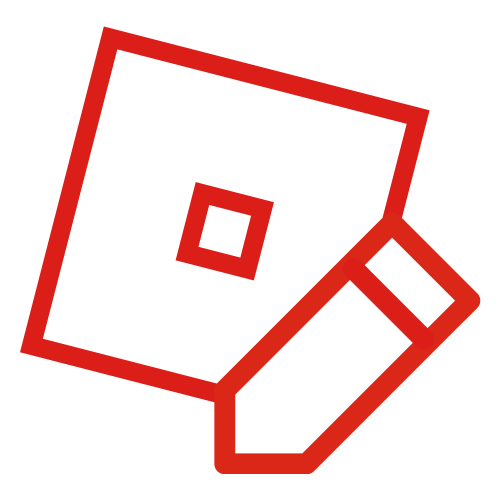The BasePart class is a structural class that holds all the properties, methods and events common to part classes, such as Part, WedgePart, CornerWedgePart, TrussPart, SpawnLocation, Seat, VehicleSeat, SkateboardPlatform, and FlagStand. The most common is the simple part. While many of these classes extend the BasePart class directly, some extend the FormFactorPart class, which is itself a subclass of BasePart. The BasePart class cannot be instantiated.
Properties
This class has forty-seven properties.
Anchored: bool
Determines whether or not physics acts upon the Part. If true, part stays 'Anchored' in space, not moving regardless of any collision/forces acting upon it. If false, physics works normally on the part.
BrickColor: BrickColor
The color of a part is set by the value of its BrickColor property. Brick colors are a set of pre-defined colors that the user may choose from to color parts, teams and other things in the ROBLOX engine.
CFrame: CoordinateFrame
Contains information regarding the Part's position and a matrix that defines the Part's rotation. Can read/write.
CanCollide: bool
Determines whether physical interactions with other Parts are respected. If true, will collide and react with physics to other Parts. If false, other parts will pass thru instead of colliding
Color: Color3
Deprecated. Use BrickColor instead
CustomPhysicalProperties: PhysicalProperties
Elasticity: float
A float value ranging from 0.0f to 1.0f. Sets how much the Part will rebound against another. a value of 1 is like a superball, and 0 is like a lead block.
Friction: float
A float value ranging from 0.0f to 1.0f. Sets how much the Part will be able to slide. a value of 1 is no sliding, and 0 is no friction, so infinite sliding.
LocalTransparencyModifier: float
Locked: bool
Determines whether building tools (in-game and studio) can manipulate this Part. If true, no editing allowed. If false, editing is allowed.
Material: Material
Specifies the look and feel the Part should have. Note: this does not define the color the Part is, see BrickColor for that.
Position: Vector3
A part's position can be changed by modifying the value of this property.
ReceiveAge: float
Reflectance: float
Specifies how shiny the Part is. A value of 1 is completely reflective (chrome), while a value of 0 is no reflectance (concrete wall)
ResizeIncrement: int
Sets the value for the smallest change in size allowable by the Resize(NormalId, int) function.
ResizeableFaces: Faces
Sets the value for the faces allowed to be resized by the Resize(NormalId, int) function.
RotVelocity: Vector3
This property defines the rotational velocity of the part it belongs to.
Rotation: Vector3
Size: Vector3
This property defines the size of the part it belongs to.
SpecificGravity: float
This property defines many times more dense than ROBLOX's water the part it belongs to is. Its value depends on the part's material.
Transparency: float
Sets how visible an object is. A value of 1 makes the object invisible, while a value of 0 makes the object opaque.
Velocity: Vector3
How fast the Part is traveling in studs/second. This property is NOT recommended to be modified directly, unless there is good reason. Otherwise, try using a BodyForce to move a Part.
brickColor: BrickColor
This property is deprecated and the BrickColor property should be used instead.
Surface inputs
The surface input properties are used to specify an input for a specific surface.
BackSurfaceInput: InputType
BottomSurfaceInput: InputType
FrontSurfaceInput: InputType
LeftSurfaceInput: InputType
RightSurfaceInput: InputType
TopSurfaceInput: InputType
Surface types
The surface type properties can be used to change the appearance of a specific surface of a part. Surface types also change the behavior of parts with other parts they are sticking to.
BackSurface: SurfaceType
BottomSurface: SurfaceType
FrontSurface: SurfaceType
LeftSurface: SurfaceType
RightSurface: SurfaceType
TopSurface: SurfaceType
Surface parameters
The surface parameter properties are used to give parameters to certain surfaces of a part. These parameters are used, for example, by the motor part surface.
BackParamA: float
BackParamB: float
BottomParamA: float
BottomParamB: float
FrontParamA: float
FrontParamB: float
LeftParamA: float
LeftParamB: float
RightParamA: float
RightParamB: float
TopParamA: float
TopParamB: float
Methods
This class has eighteen methods.
BreakJoints(): void
Destroys SurfaceJoints with all parts that are touching this Instance (including internal joints in the Instance, as in a Model).
CanSetNetworkOwnership(): Tuple
GetConnectedParts(recursive: bool = false): Objects
GetMass(): float
Returns a number that is the mass of this Instance. Mass of a Part is immutable, and is changed only by the size of the Part.
GetNetworkOwner(): Instance
GetNetworkOwnershipAuto(): bool
GetRenderCFrame(): CoordinateFrame
GetRootPart(): Instance
GetTouchingParts(): Objects
IsGrounded(): bool
MakeJoints(): void
Creates the appropriate SurfaceJoints with all parts that are touching this Instance (including internal joints in the Instance, as in a Model). This uses the SurfaceTypes defined on the surfaces of parts to create the appropriate welds.
Resize(normalId: NormalId, deltaAmount: int): bool
Resizes a Part in the direction of the face defined by 'NormalId', by the amount specified by 'deltaAmount'. If the operation will expand the part to intersect another Instance, the part will not resize at all. Return true if the call is successful, false otherwise.
SetNetworkOwner(playerInstance: Instance = nil): void
SetNetworkOwnershipAuto(): void
breakJoints(): void
getMass(): float
Use GetMass instead.
makeJoints(): void
Use MakeJoints instead.
resize(normalId: NormalId, deltaAmount: int): bool
Events
This class has six events.
LocalSimulationTouched(part: Instance)
Deprecated. Use Touched instead.
OutfitChanged()
This event will be fired when one of the visual properties of the part it belongs to is changed.
StoppedTouching(otherPart: Instance)
Deprecated. Use TouchEnded instead.
TouchEnded(otherPart: Instance)
Fired when the part stops touching another part
Touched(otherPart: Instance)
This event will be fired by the game engine when a part touches the part to which the event belongs.
touched(otherPart: Instance)
This event is deprecated. The Touched event should be used instead.
